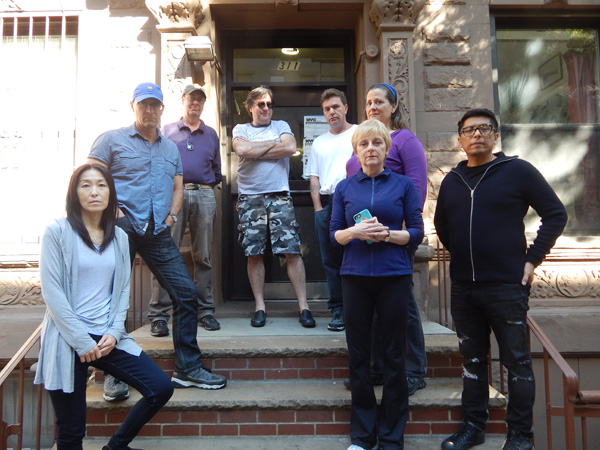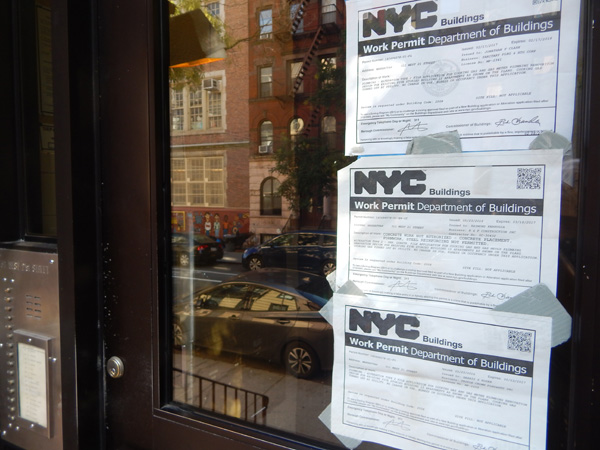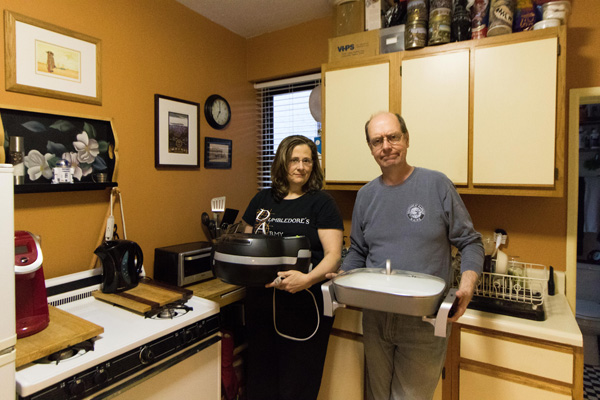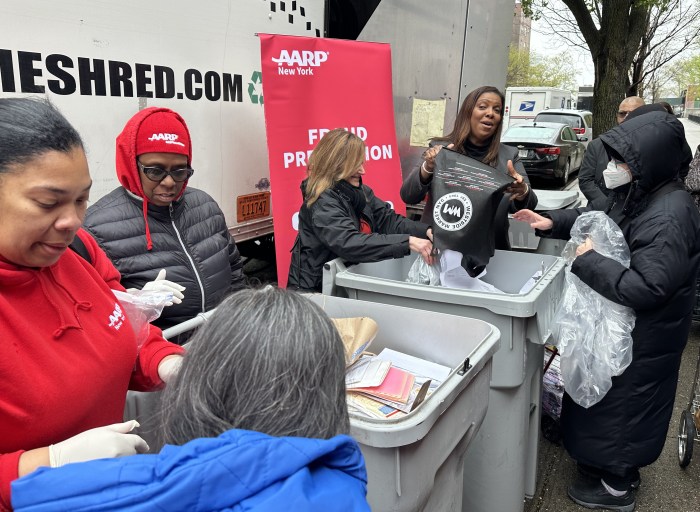
BY WINNIE McCROY | A group of Chelsea tenants who have not had cooking gas for over 20 months — and who often don’t have reliable heat or hot water — are fired up over what they call a pattern of harassment by a bad landlord who just wants to see them leave.
In an Apr. 19 article (“Knowledgeable Tenants Challenge Lack of Utilities, Shady Landlord Tactics”), Chelsea Now first reported about an ongoing situation at the five-story apartment building at 311 W. 21st St. (btw. Eighth & Ninth Aves.), where longtime tenants Kelly Maurer and Jordan Lage say new owners NYC Management Corp. continue to collect their rent checks every month (via Certified Mail, which some tenants say the company refuses to cash) while failing to provide much maintenance beyond trash removal.
Con Edison cut off the gas back in Feb. 2016 after a gas leak — but when former owner Sidney Rubell sold the property, plans for a new gas system were put on hold. Since that time, tenants say they’ve been subject to harassment, including regular shutdowns of heat and hot water, in an effort to get them to move out.
“It was 41 degrees the other day, and there was no heat,” said Steven Zivkovic, who has lived in the apartment for 47 years. “Someone needs to pay attention to this!”
“We have hot water, but on the last few cold nights, no heat was coming through the radiator,” said Lage. “The weather hasn’t been too cold yet, but everyone in the building is girding their loins and saying, ‘Here we go again!’ ”

The clock is ticking as winter approaches, but a recent development might provide some hope. As the result of a legal case brought against the landlord by the NYC Department of Housing Preservation and Development (HPD) a judge has ordered that gas must be restored to the property by the end of this month, or face consequences for non-compliance.
“We will continue to support the tenants in housing court and bring our own cases against the owner as warranted,” said HPD Press Secretary Juliet Pierre-Antoine. “If a property owner creates an unsafe living environment for their tenants, we will continue to use all of the enforcement capabilities tools [available] to us to hold them accountable. All tenants throughout the City deserve safe and decent homes. We will continue to monitor the situation.”
Recalling the events of Oct. 2, Maurer told Chelsea Now, “We were heartened by the fact that a gas plumber showed up with a permit that seemed to be within the law for both occupancy and regulations,” even when that worker reportedly told tenants that if all went well, they would have cooking gas restored within four months.
But those hopes were dashed a week later, Maurer recalled, when NYC Management Corp. sent tenants an email acknowledging the problem, then asking if they’d like two-burner hot plates and toaster ovens to rectify it.
“We’ve had that since February 2016 — that’s the only way I can cook,” said Lage, disappointed. “They’re late on that ball by a year and a half.”
Zivkovic echoed this sentiment, saying, “Getting a $25 hot plate from Amazon does not appease me. We need to expose this.”
Maurer wrote the management company back to say ‘no thanks,’ but noted that the company delivered a shipment of cooking appliances on Oct. 21, which residents refused to accept. In her email, Maurer noted she told her landlord that Councilmember Corey Johnson’s office wanted to set up a meeting between the landlord and tenants to discuss how they could move forward in the future, so the company could safely begin construction while still providing basic services to existing tenants.
Said Maurer, “The email I got back from NYC Management said they’d been in full communication with all of the tenants at 311, and the request to meet with us and the Councilmember’s office was denied. They won’t meet with us and they won’t meet with them.”
“My office has been working with tenants of 311 West 21st Street to ensure they are safe during this completely unacceptable situation,” Councilmember Johnson told Chelsea Now. “They have now been without gas for 20 months and I understand that the NYC Department of Housing Preservation and Development has brought a comprehensive litigation case against the owner and received a consent order from a judge to restore gas to the building. I encourage anyone who is unsuccessful in resolving heat issues with their landlord to report it to 311 and my office at 212-564-7757.”

Tenants of the building say that Matt Green, Councilmember Johnson’s Deputy Chief of Staff, Community Affairs, has been a tireless advocate for them, with Lage noting, “It’s nice to know there’s actually a politician’s office that’s on your side. But my understanding is that NYC Management just blows them off. They don’t show up or they just pay the fines. To them, this is just the cost of doing business.”
As reported in an Oct. 4 Chelsea Now article (“New Laws Give More Muscle To Tenant Safety”), tenants subject to these conditions have been given some hope via a raft of legislation by Mayor Bill de Blasio, who on Aug. 30 signed into law 18 pieces of tenant safety legislation designed to mitigate these “construction as harassment” tactics. Tenants of 311 W. 21st St. may be able to benefit from NYC Councilmember Stephen Levin’s bill to create a Real Time Enforcement Unit within the Department of Buildings (DOB) to quickly follow up on complaints of work being done without a permit.
Another part of this package was NYC Councilmember Helen Rosenthal’s bill creating an Office of Tenant Advocate to serve as an internal watchdog at the DOB. Although it’s not yet clear who will be staffing this position, the position will go into effect on Dec. 28.
“This is an instance in which residents and local elected officials have had to struggle to get the Department of Buildings to do the right thing,” said Councilmember Rosenthal in an Oct. 23 email to Chelsea Now. “It looks like DOB has taken some corrective actions, but it’s a large bureaucracy and those steps took a lot of outside work. When the Office of Tenant Advocate is installed within the DOB, we will have staff at the agency who will be solely responsible for defending tenants’ rights — helping to get things right and, crucially, to continue to follow up until situations like these are fully addressed.”
Although representatives of the DOB originally argued that a Tenant Advocate was not necessary, DOB Deputy Press Secretary Andrew Rudansky told Chelsea Now in an Oct. 18 email that the “DOB won’t tolerate landlords who use construction activity to harass their tenants. We are a proud partner in the city’s Tenant Harassment Protection Task Force, though which we’ve conducted more than 2,000 tenant-related safety inspections in the last year, including at this property.”

Tenants maintain that it’s a vicious circle, with the landlord illegally applying for permits. Once tenants inform the DOB that rent-regulated tenants are in the building, an inspector’s findings may invalidate the permit — after which the landlord just repeats the application process.
The past history of permit applications submitted and denied speaks to this situation, although the DOB indicates that inspectors have found no violations at this building since an Aug. 2017 inspection, and no complaints.
Tenants are skeptical that more legislation will solve their problems. Lage said it may depend on how the rules and regulations define “middle class,” as many advocates are only authorized to help those who fall well below the poverty line. Maurer noted that 11 of the laws passed have the potential to help lower-middle class people throughout the city — but only if they are enforced.
“At this point, with 20 months of no cooking gas, many calls to the DOB about no heat and hot water last winter, with repeated falsifications on submitted permits, where are the fines?” asked Lage. “Where are the consequences for them that would make them stop doing this? What does it take before the city steps up and says, ‘enough?’ These people are being harassed and abused in their own homes.”

















